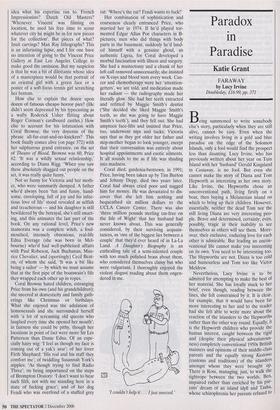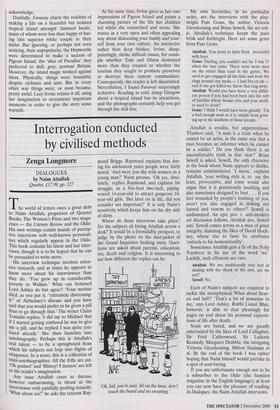Paradox in Paradise
Katie Grant
FARAWAY by Lucy Irvine Doubleday, £16.99, pp. 371 Being summoned to write somebody else's story, particularly when they are still alive, cannot be easy. Even when the writing involves living in a gold and blue paradise on the edge of the Solomon Islands, only a fool would find the prospect less than daunting. Lucy Irvine, who has previously written about her year on Tuin Island with her `husband' Gerald Kingsland in Castaway, is no fool. But even she cannot make the story of Diana and Tom Hepworth as interesting as her own story. Like Irvine, the Hepworths chose an unconventional path, living firstly on a boat, then buying a Melanesian island on which to bring up their children. However, essentially, neither the dead Tom nor the still living Diana are very interesting peo- ple. Brave and determined, certainly; even, possibly, tragic in their inability to see themselves as others will see them. More- over, their exclusive, enduring love for each other is admirable. But leading an uncon- ventional life cannot make you interesting on its own. You need to be interesting too. The Hepworths are not. Diana is too cold and humourless and Tom too like Victor Meldrew.
Nevertheless, Lucy Irvine is to be admired for attempting to make the best of her material. She has loyally stuck to her brief, even though, reading between the lines, she felt constrained by it. It is clear, for example, that it would have been far more interesting to her and to the reader had she felt able to write more about the reaction of the islanders to the Hepworths rather than the other way round. Equally, it is the Hepworth children who provide the human interest, caught between the rigid and (despite their physical adventurous- ness) completely conventional 1950s British manners and opinions of their middle-class parents and the equally strong Kastoms (customs and traditions) of the islanders amongst whom they were brought up. There is Ross, managing, just, to walk the tightrope between the two worlds, Ben, impaired rather than enriched by his par- ents' dream of an island idyll and Tasha, whose schizophrenia her parents refused to acknowledge. Dutifully, Faraway charts the realities of making a life on a beautiful but isolated tropical island amongst 'damned locals', many of whom were less than happy at hav- ing this superior white couple in their midst. But ignoring, or perhaps not even noticing, their unpopularity, the Hepworths were determined to make a success of Pigeon Island, the 'slice of Paradise' they preferred to dull, grey, postwar Britain. However, the island magic worked against them. Physically, things were beautiful, despite cyclones and ants. But in every other way things were, or soon became, pretty awful. Lucy Irvine relates it all, using her imagination to reconstruct important moments in order to give the story some warmth. At the same time, Irvine gives us her own impressions of Pigeon Island and paints a charming picture of the life her children led whilst she researched and wrote. She muses in a very open and often appealing way about dislocating your family and your- self from your own culture. An instinctive rather than deep thinker, Irvine, disap- pointingly, shirks difficult issues, for exam- ple whether Tom and Diana destroyed more than they created or whether the tourism they sought to promote preserves or destroys these remote communities. Consequently, the reader is left dissatisfied. Nevertheless, I found Faraway surprisingly seductive. Reading in cold, damp Glasgow about a tropical island has its attractions, and the photographs certainly help you get through the dull bits.



















































































 Previous page
Previous page